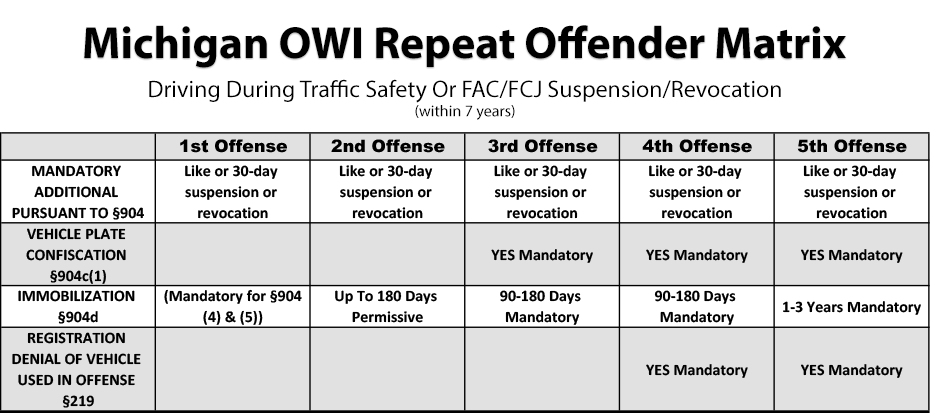Three Or More DUI’s In Michigan – Felony OWI
When someone has at least two DUI convictions on their criminal record, subsequent drunk driving charges may be prosecuted as felonies. This is commonly referred to as OWI III, or simply felony OWI. The Michigan legal system is known to take drunk driving offenses seriously so penalties for a third OWI can be rather extensive. In fact, it’s possible to receive life in prison for having more than three or more DUI convictions in the State of Michigan.
Given the potential consequences for a Third Offense DUI, choosing a good attorney is absolutely critical. Working with an experienced DUI defense lawyer with a track record of success will not only ensure your legal rights are upheld but may in fact save your life.
Felony OWI
In Michigan, the most common drunk driving offense is Operating While Intoxicated (OWI). Simply put, an OWI involves operating a motorized vehicle with a Blood Alcohol Content at or above of 0.08% (0.02% for minors). The full details on what constitutes an OWI are available on the Michigan Legislature MCL 257.625(1)(b).
As previously discussed, when someone has two or more OWI convictions on their criminal record, any subsequent OWI convictions can be prosecuted as felonies. In addition to this, a first OWI can be charged as a felony if it results in serious bodily injury or death. If an individual accumulates enough felony drunk driving convictions on their record, they can even face life in prison upon their next charge in Michigan.
Penalties For DUI (Third Offense)

The penalties for a third drunk driving offense are far more severe than first or second offenses. As mentioned previously, a third OWI is considered a felony instead of a misdemeanor. This carries with it dramatically increased fines and jail time, as well as increased community service. Below is a list of penalties an individual convicted of felony OWI can expect.
- Up to five years in prison
- Fines of up to $5000
- Mandatory community service of up to 180 hours
- Drivers license revocation
- Forfeiture of the vehicle
While these legal penalties are severe, there are also collateral consequences associated with a felony drunk driving conviction. As a felon, it is very difficult for a person to find employment and housing – even after completing their sentence and probation. In addition to this, it is very likely that they will lose their ability to hold certain professional licenses – such as those held by doctors and lawyers. Also, as a felon you permanently lose your right to own and carry a firearm. Often people find that these collateral consequences are more significant to their everyday lives than the legal penalties themselves.




